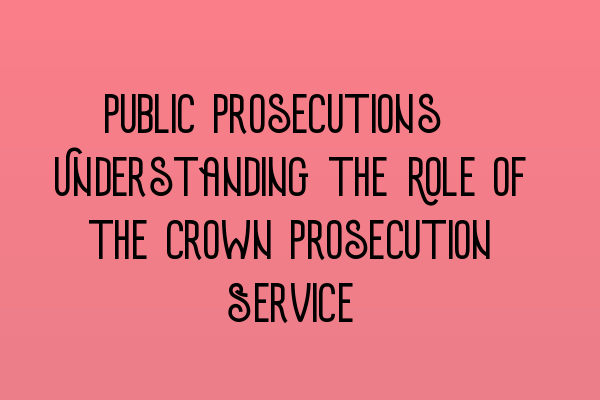Public Prosecutions: Understanding the Role of the Crown Prosecution Service
Welcome to SQE Criminal Law & Practice Law UK! In this blog post, we will explore the important role played by the Crown Prosecution Service (CPS) in public prosecutions. Understanding the functions and responsibilities of the CPS is crucial for aspiring solicitors and legal professionals.
What is the Crown Prosecution Service (CPS)?
The Crown Prosecution Service is an independent public authority responsible for prosecuting criminal cases in England and Wales. It operates under the umbrella of the Attorney General’s Office and is headed by the Director of Public Prosecutions (DPP).
The CPS works in close collaboration with the police and other law enforcement agencies to make decisions regarding criminal charges. Its primary aim is to ensure that the right person is prosecuted for the right offence, and to bring justice to victims and the society as a whole.
Roles and Responsibilities of the CPS
The CPS carries out several key functions and responsibilities:
- Decision-making: The CPS makes crucial decisions on whether to prosecute a suspect based on the evidence gathered by the police. Their assessment is guided by the Code for Crown Prosecutors, which sets out the principles that must be followed.
- Evidence gathering: The CPS works closely with the police to ensure that all necessary evidence is gathered and presented in court. This involves liaising with witnesses, reviewing case files, and instructing expert witnesses when required.
- Court advocacy: The CPS presents the prosecution’s case in court. Its prosecutors, known as Crown Prosecutors, are qualified solicitors or barristers who possess the necessary expertise to present legal arguments effectively.
- Victim support: The CPS prioritizes the needs and interests of victims, providing support and guidance throughout the legal process. This includes advising victims on their rights, helping them understand court proceedings, and ensuring their voices are heard during the trial.
- Collaboration: The CPS works closely with various stakeholders, including the police, defense solicitors, probation services, and other criminal justice agencies, to ensure effective coordination in the prosecution process.
The Importance of the CPS
The Crown Prosecution Service plays a vital role in maintaining public trust and confidence in the criminal justice system. By ensuring that criminal cases are prosecuted fairly and effectively, the CPS contributes to upholding the rule of law and promoting a just society.
Moreover, the CPS also plays a significant role in protecting the rights of victims and witnesses. Its support and guidance help alleviate the impact of crime on individuals and communities.
For aspiring solicitors and legal professionals, it is essential to have a comprehensive understanding of the CPS and its functions. Knowledge of the CPS’s operations is not only valuable for academic purposes but also for successful practice in criminal law.
Conclusion
In conclusion, the Crown Prosecution Service plays a crucial role in public prosecutions in England and Wales. Its decision-making, evidence gathering, court advocacy, victim support, and collaboration with other criminal justice agencies make it an integral part of the legal system.
If you’re preparing for the SQE 1 exam, be sure to check out our SQE 1 Practice Exam Questions and SQE 1 Practice Mocks FLK1 FLK2 articles for valuable resources.
For comprehensive preparation courses for both SQE 1 and SQE 2 exams, visit our SQE 2 Preparation Courses and SQE 1 Preparation Courses pages.
Stay updated with the latest SRA SQE exam dates by visiting our SRA SQE Exam Dates page.
Thank you for reading and stay tuned for more informative articles!
